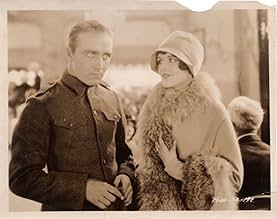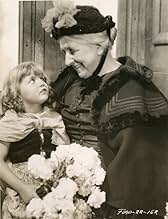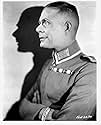Una saga familiar en la que tres de los hijos de una viuda bávara van a la guerra por Alemania y el cuarto va a Estados Unidos, el eventual oponente de Alemania.Una saga familiar en la que tres de los hijos de una viuda bávara van a la guerra por Alemania y el cuarto va a Estados Unidos, el eventual oponente de Alemania.Una saga familiar en la que tres de los hijos de una viuda bávara van a la guerra por Alemania y el cuarto va a Estados Unidos, el eventual oponente de Alemania.
- Premios
- 3 premios en total
Frank Baker
- Soldier
- (sin acreditar)
George Blagoi
- Officer
- (sin acreditar)
Stanley Blystone
- Officer
- (sin acreditar)
Carl Boheme
- Officer
- (sin acreditar)
Constant Franke
- Officer
- (sin acreditar)
Reseña destacada
Other than The Iron Horse we rarely see John Ford's silent films. But in viewing Four Sons we can certainly spot a lot of stylistic traces and themes that mark Ford's more well known sound films.
Before The Iron Horse Ford was a director of Grade B westerns mostly starring Harry Carey. After The Iron Horse Ford started doing other kinds of films. A story with a German setting one might think would be unusual for Ford, but you examine it closely this film is as sentimental as any of his Irish films. And Margaret Mann who played the mother of the Four Sons was a harbinger of such later mother characters in Ford films as Olive Carey, Irene Rich, and the grandmama of them all, Jane Darwell.
Watch also how Ford handles the military sequences in both the German and American settings. The cultural differences are there, but the military way is universal. John Wayne is listed in a bit role as an Officer and I think I spotted him during a scene at a railway station where a particularly nasty Teutonic major played by Earle Foxe. Wayne I believe is one of his aides.
The story is a simple one Margaret Mann is a widow with four grown sons in a village in Bavaria. The sons are James Hall, Charles Morton, Ralph Bushman, and George Meeker. Hall has been in communication with a friend in America urging him to emigrate from Germany and he does. Hall does achieve the American dream, opening a successful business, marrying June Collyer and giving Mann her first grandchild. Then World War I comes and that's the rest of the story as Paul Harvey used to say.
Four Sons holds up well even after 80+ years. Mann's trials and tribulations as a mother certainly is a universal theme. And the ending is as happy and sentimental one as John Ford ever devised in any of his films.
Before The Iron Horse Ford was a director of Grade B westerns mostly starring Harry Carey. After The Iron Horse Ford started doing other kinds of films. A story with a German setting one might think would be unusual for Ford, but you examine it closely this film is as sentimental as any of his Irish films. And Margaret Mann who played the mother of the Four Sons was a harbinger of such later mother characters in Ford films as Olive Carey, Irene Rich, and the grandmama of them all, Jane Darwell.
Watch also how Ford handles the military sequences in both the German and American settings. The cultural differences are there, but the military way is universal. John Wayne is listed in a bit role as an Officer and I think I spotted him during a scene at a railway station where a particularly nasty Teutonic major played by Earle Foxe. Wayne I believe is one of his aides.
The story is a simple one Margaret Mann is a widow with four grown sons in a village in Bavaria. The sons are James Hall, Charles Morton, Ralph Bushman, and George Meeker. Hall has been in communication with a friend in America urging him to emigrate from Germany and he does. Hall does achieve the American dream, opening a successful business, marrying June Collyer and giving Mann her first grandchild. Then World War I comes and that's the rest of the story as Paul Harvey used to say.
Four Sons holds up well even after 80+ years. Mann's trials and tribulations as a mother certainly is a universal theme. And the ending is as happy and sentimental one as John Ford ever devised in any of his films.
- bkoganbing
- 29 may 2010
- Enlace permanente
Argumento
¿Sabías que...?
- CuriosidadesThe film set a permanent attendance record at New York's Roxy Theater
- PifiasIn the New York City sequences, which take place immediately after World War I (1919-1920), all of the women's fashions are strictly in the style of 1928, and all of the automobiles are of late-1920s design.
- Citas
The Schoolmaster: Books, Herr Postman, are friends that never deceive,
- ConexionesFeatured in Hollywood (1980)
- Banda sonoraLittle Mother
(1928) (uncredited)
Music by Erno Rapee
Lyrics by Lew Pollack
Sung by Harold Van Duzee and the Roxy Male Quartette
Selecciones populares
Inicia sesión para calificar y añadir a tu lista para recibir recomendaciones personalizadas
Detalles
- Duración1 hora 40 minutos
Contribuir a esta página
Sugerir un cambio o añadir el contenido que falta
























